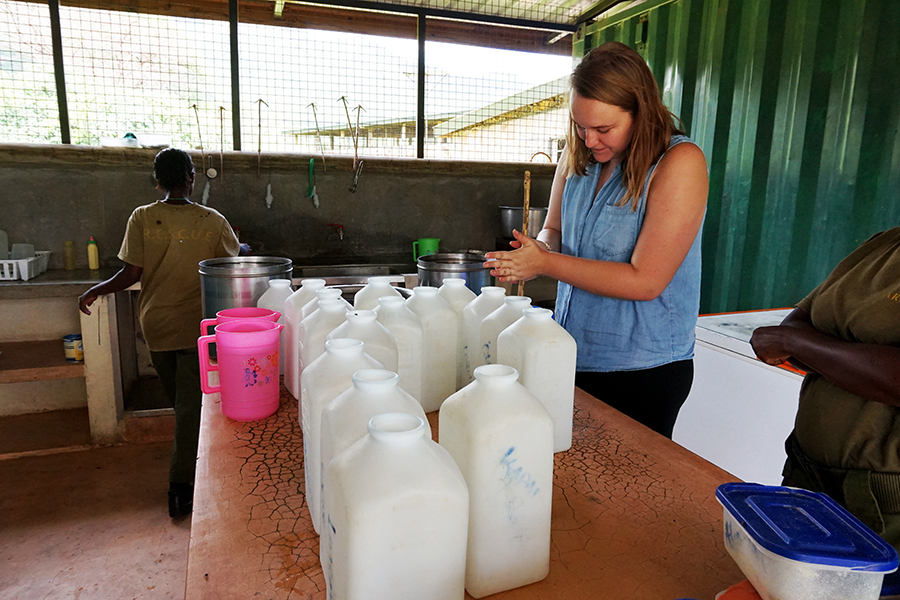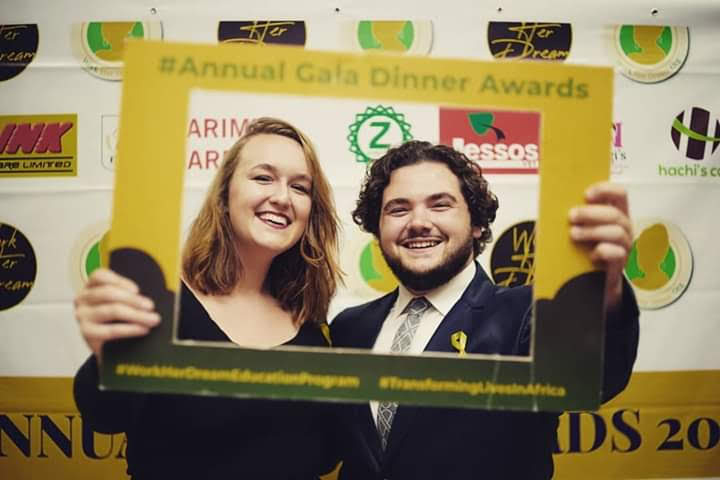Right place, right time: Her aflatoxin research matters to Kenyans

As if Margaret Hegwood needed a reminder that what she’s doing is important. “Last week, multiple maize flour brands and six peanut butter brands were recalled for aflatoxin contamination,” she said in an early November email from Eldoret, Kenya. “A lot of Kenyans are curious about my research, and when I tell them it involves aflatoxins, they have lots of questions about how they can stay safe.”
Aflatoxins are carcinogenic compounds made by molds. Hegwood’s master’s thesis is on optimizing extrusion processing parameters for aflatoxin decontamination in Kenyan staple crops. “In particular, with the mini extruder designed by my faculty member, Dr. Martin Okos,” she said. “There is also a lot of ag econ-esque work included. I correlate aflatoxin infection rates with storage practices, location, origin, vendor type, etc.”
Some research never leaves the lab. Not hers. And she’s glad. “I can actually help with that,” she said. “I can give them advice. I can tell them safer ways to harvest maize, or which peanut products to avoid to avoid high aflatoxin contamination rates. It’s great to know that my research not only has relevance in the academic world but also in the lives of everyday people.”
Hegwood is in Kenya for a third time, this time on a Boren Fellowship for national security and strategic language studies. The fellowship is through the U.S. Department of Defense. Learning the language is an expectation. “Three of my Swahili lessons are with a formal teacher,” she says. “The other two are with a friend who I practice speaking with for an hour straight. “One of the coolest things that happened: I was buying maize from a vendor (all in Swahili) and when I turned around I heard them say, ‘Anaongea kiswahili!’ Which means, ‘She speaks Swahili!’ I felt really accomplished in my language skills at that moment, especially because languages don’t come naturally to me.” Improving or maintaining positive foreign relations is one reason for the Boren Fellowship’s language requirement. Hegwood seeks to become a globally competent biological engineer.
“For me, global competency means building three things: empathy for others, self-awareness, and emotional resilience,” she said. “The last one is especially hard. Learning how to live and thrive in a new environment means being OK with making mistakes and receiving criticism. You’re trying to simultaneously fit in to a new culture while also finding a version of yourself there that doesn’t compromise your own beliefs or values. This balance – maintaining self while also achieving personal growth – is really difficult, but that makes it one of the most important pieces of global competency.”
We asked Margaret Hegwood to describe her life in Kenya
Something you’ll learn when you live in a place like Kenya is that no day is the same. Normally, I try to keep a schedule of three days a week at the University of Eldoret and two days a week working at home/practicing Swahili at the Tumaini Innovation Center, where I have worked previously on the PUP project.
However, I don’t stick to this very easily. Some days I spend all day in town finding research equipment or the right person to help me do research. For most of October, I was traveling all across the county conducting fieldwork. Those were long days – 8, 9, 10 hours out and about meeting with farmers, millers, and market vendors. A strict budget is also a factor. Transportation costs – since I can only take taxis for safety reasons – can add up quickly.
Adjusting to the food and water is easy. Eldoret town has large supermarkets with almost everything you need. I think adjusting to the culture is more difficult than physical needs. Kenyans live in a very connected culture. They thrive off community and bonding with their friends, family, etc. So, to get things done, you have to be willing to form relationships. For example, when you walk into the store and you want help, you don’t immediately ask for something. First, you say, “Hi, how are you? Good? That’s great. I’m also good. How is your day going?” Then you can ask for something you need help with. This is even more important when working on big projects, like with the farmers I meet. It takes about 30 to 60 minutes to collect each sample from farmers simply because I spend so much time just talking to them.
Honestly, it can be exhausting at times to form these relationships, but they’re invaluable. I think my persistence in building relationships (and therefore trust) with Kenyans is what has allowed me to be so successful here thus far. It’s the reason I’ve been able to engage local government and private industry on my project. I won’t discredit my effort to speak the local language either. When I say “Habari yako?” (“How are you?”) it changes people’s entire perception of me – it switches the question in their mind from “Why are you here?” to “How did you come to learn Swahili?”, which is a question that offers more room for collaboration.
(A good friend of mind recently pointed out this nuanced difference between why and how. He made a good point: “Why?” is often loaded with judgment. “How?” is a question with more possibilities for learning about someone and their perspective/experience.)
In terms of progress, I definitely feel like I’m getting somewhere, even if it’s slower than I would like some days. It makes me really glad to have such an integrated Kenyan team. I’m the only American working on my project (excluding my advisor, technically), so I work entirely with Kenyans. It’s pretty awesome actually. I’m also excited that the local government is supportive of my work. I worked with county extension officers to do all of my fieldwork. All of my results will be shared with them in a report so they can target weaknesses in the supply chain. I also work with the lab tech at the local flour factory to test my samples.

